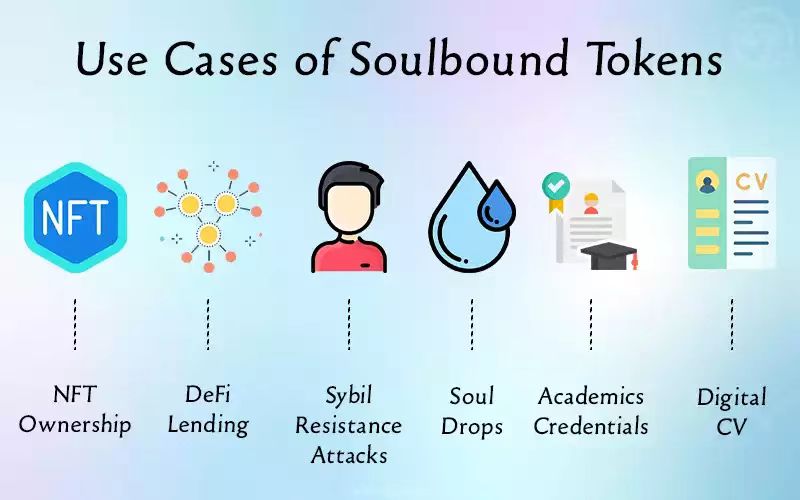Is it necessary to say goodbye to the utopia of the crypto world? Four thoughts on the soul binding of Web3 native identity
Author: Wang Feng, Xiaoyin in the Chain
Source: MarsBit
In a bear market, learn more and occasionally write essays.
Last night, I finally found the time to finish reading an important paper in the blockchain field from May of this year.
This paper, co-authored by E. Glen Weyl, Puja Ohlhaver, and Vitalik, titled "Decentralized Society: Finding the Soul of Web3," focuses on the eve of Ethereum 2.0's launch, at a time when NFTs have become the largest GAS fuel on Ethereum. It reveals the authors' strategies and capabilities in vying for the narrative power of the next era in the crypto market.
Since it does not touch upon the direct interests of the vast majority of current traders, and many related proposals are still in the verification and controversy stages, the significance of this paper resembles that of an academic document, easily overlooked by most people, far less attention-grabbing than the recent Odyssey airdrop on L2. Here are my four reflections after reading:
1. Is my identity just a wallet address?
In the world of Web3, give me a native identity that belongs to me. My identity is not a wallet address. After all, in this world, not everything can be labeled with money; at least we often hear in literary works someone say, "I will not sell my soul," or say, "You traitor, you sold your soul." The two mentions of soul here are relevant to this article, but their interpretations differ.
In fact, for a long time, we have pondered the following questions:
- Is it necessary to prove my identity, learning, work experience, and some reputation in a decentralized world?
- If not, then what can I use as my persistent identity to maintain our credit in the lack of personal credit in the Web3 world?
- In the crypto world, do trust relationships between people and cooperation between individuals and organizations merely stop at the scale of DeFi staking?
Cryptographic technology has advanced too quickly; at the outset, few people paid attention to these questions. Einstein said at the Geneva Conference in 1932: "Human organizational ability has not kept pace with technological development, which is akin to giving a 3-year-old a razor."
What about the crypto economy? Every significant change in humanity has been preceded by technological leaps, followed by organizational changes.
Looking back at the inception of blockchain, it has always been firmly rooted in the ideology of "overturning the traditional financial system." I once heard the founder of Maker DAO candidly state at a dinner introduction that blockchain has struck the old and rigid financial system, which was quite shocking at the time. Checking our past rhetoric, it has always revolved around finance. Whether it is Bitcoin or Ethereum, both were initially dedicated to the revolution of financial technology. Bitcoin established a peer-to-peer cash payment system; Ethereum's long-standing market slogan was "building a global settlement infrastructure."
In less than a decade, Web3 has created a unique and flexible parallel financial system. With components such as public key cryptography, smart contracts, proof of work, and proof of stake in the crypto economy, though incomplete, it has brought an imaginative open ecosystem to decentralized Wall Street. However, today, for builders of Web3, merely these components are far from sufficient.
2. Current Web3 identities can only be confined within the limitations of Web2 historical scenarios
Due to the current lack of underlying system components representing this social identity in Web3, it fundamentally relies on the centralized Web2 structure it aims to surpass, often mockingly referred to as Web2.5/Web2.8, thus replicating its limitations. For example:
------ Most NFT artists rely on centralized platforms like OpenSea and Twitter to promise scarcity and initial provenance. In the crypto ocean, there are originally no identity beacons; various qualifications are entirely dependent on the discerning eyes of Web2 market overlords.
------ DAOs attempting to transcend simple token voting often rely on Web2 infrastructure, such as social media accounts, to resist witch attacks.
BTW, what is a witch attack? Simply put, one address with multiple identities is akin to vote or order manipulation. A more precise mathematical expression can be illustrated by Filecoin storage mining, where miners use N identities, promising to store N pieces of data. But in reality, they store less than N pieces of data, falsely reporting that they have stored N pieces. In the past, everyone tacitly understood this; what comes next?
------ Many Web3 participants, on one hand, advocate for decentralization and embrace DEX in DeFi, while on the other hand, they heavily rely on custodial wallets managed by centralized entities like Coinbase or Binance. The current situation is somewhat awkward, as decentralized key management systems are far from user-friendly for ordinary users.
Of course, there are also numerous potential security issues, like ticking time bombs, and there are thorns in the back. After the Phantom incident, centralized exchanges awkwardly called Solana wallet users back home.
3. Definition and application scenarios of soul binding
This paper offers a solution. It is very similar to the DID we have seen before, known as Decentralized Identity (DID). DID evolved from traditional ID systems, and its core idea is that in the decentralized identity phase, users can fully control their information data without being controlled by companies like Facebook. Many people have been working on this, with various mechanisms, but I had never looked closely before. I will discuss it separately when I have time.
Unlike DID, the authors directly introduce a very important Ethereum blockchain proposal, launching a non-transferable NFT based on the ERC721 protocol. Vitalik named it SBT (Soul Bound Token), and most Chinese translations refer to it as 灵魂绑定代币 (Soul Bound Token).
When proposing SBT, Vitalik raised a new banner: "A grander vision of DeSoc, establishing a decentralized society that is governable, composable, and based on collective intelligence development." Vitalik's focus has shifted from the previous decentralized financial ecosystem to the next step of decentralized social experimentation.
He mentioned the important role of soul binding (SBT) in various use cases. These include many aspects, such as the following application cases:
- Unsecured lending
- Social recovery wallets
- Airdrop actions based on soul-bound addresses
- DAO witch defenses, etc.
I found a picture (thanks to the author)

Imagine what happens next. Any institution or individual can issue SBTs to a fixed wallet, such as:
- Graduating schools
- Companies worked for
- Honors from sports competitions
- Participated charitable organizations
- DeFi platforms for loans or liquidity mining
- DAO organizations deeply involved in
Yes, your wallet can receive various SBTs. It's somewhat like a medal wall in the gaming world.
Since SBTs are non-transferable and non-tradable, they almost lack the speculative attributes we currently see in NFTs. Today's NFTs seek scarcity in various non-fungible aspects, while SBTs indicate identity differences within the inherent attributes of a fixed wallet holder. This new type of NFT, detached from trading, is destined to guide our entire crypto technology industry back to exploring new values in a social context. My intuition suggests that the following events are likely to happen soon:
------ Decentralized social platforms supporting SBTs may pave the way for the crypto market to prioritize social aspects over financial ones.
------ Several NFT trading markets will soon add special sections for SBT wallets.
------ Cryptocurrency trading platforms will airdrop to existing KYC users worldwide.
It is certain that the potential SBT explosion ahead will likely be chaotic, with airdrops happening everywhere, letting the bullets fly.
4. When it comes to evangelism, we still look to Vitalik
In my personal opinion, if SBT (I don't know if you've thought of a keyboard term called "Dead Pervert SBT") is to be translated into Chinese, it is better to call it 灵魂绑定令牌 (Soul Bound Token). The term "令牌" (token) is not new; it can be found in the computer field, similar to the commonly used term "Mint" in today's NFT market. The reason is simple: a soul-bound token is a non-tradable token. If we insist on translating it as "代币" (currency), it may confuse most people.
In fact, Vitalik independently published an article titled "Soul Bound" in February of this year, introducing the idea of designing non-transferable NFTs using the concept of soul binding from the game World of Warcraft. This reminds me of an online conversation I had with Vitalik four years ago, where he actively mentioned his obsession with the game World of Warcraft during his youth until he encountered Bitcoin.
Gamers are not unfamiliar with the name Soul Bound; this term originated from the classic MMORPG (Massively Multiplayer Online Role-Playing Game) World of Warcraft, where soul-bound items are top-tier items that can only be bound to a fixed game character, meaning they can only be used by the player themselves and cannot be transferred or sold to other players.
In the same gaming context, their kids are different. Vitalik certainly didn't play World of Warcraft for nothing. How I wish that among the more than 100 million players of Honor of Kings, a great figure in the crypto world would emerge soon.
It must be said that Vitalik is the most forward-thinking wizard in the entire crypto magical forest. I remember a month ago, during a casual chat with a blockchain engineer who has been in Silicon Valley for a long time, we discussed the importance of technological influence on blockchain projects. He evaluated Vitalik as a second-rate engineer, a first-rate researcher, and a superlative evangelist. I could tell that this was not a mundane mockery but rather a high-level compliment.
What kind of world does Vitalik envision for DeSoc?
I once saw a well-known Taiwanese entertainment star add a suffix to her Twitter name after issuing her own NFT—Web3 Citizen. Compared to her widely recognized artist identity, she wanted to emphasize her new digital identity as a citizen from the Web3 world.
Vitalik's proposal of SBT attempts to answer a key question in the crypto utopia: every citizen in Web3, besides declaring the sovereignty of their sacred wallet address, needs to answer the most important philosophical question of all time—Who am I?
However, I once saw a friend online express doubts about SBT.
------ How can it solve the interference of market bots?
------ If this is truly done, can it resolve trust issues in the crypto world?
------ Will it violate the principles of fairness in the new round of competition?
------ And a bigger question: do we really want to return to the contribution and power mechanisms that our current world practices?
As I write to this point, I somewhat understand what I have always found more perplexing than the theory of relativity—Wittgenstein. Physics gives us headaches, while philosophy may drive us mad.
"You think in the language you express." This philosopher said so.











